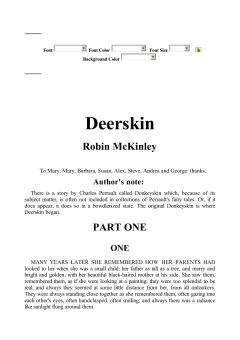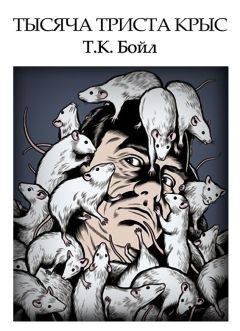Deerskin - Robin McKinley
На сайте mybooks.club вы можете бесплатно читать книги онлайн без регистрации, включая Deerskin - Robin McKinley. Жанр: Прочее издательство неизвестно,. Доступна полная версия книги с кратким содержанием для предварительного ознакомления, аннотацией (предисловием), рецензиями от других читателей и их экспертным мнением.
Кроме того, на сайте mybooks.club вы найдете множество новинок, которые стоит прочитать.

Deerskin - Robin McKinley краткое содержание
Robin McKinley читать онлайн бесплатно
Lissar shook her head-gingerly, still blinking. "No. I'm just-still not accustomed to so many people."
Lilac looked at her a moment longer, and dropped her hand. "I still wish you'd let me loan you some shoes. Barefoot before the king and queen!" She shook her head, but she was smiling again.
Lissar murmured, "I like to know where I'm walking. In shoes I'm always walking on shoes."
"Well, it identifies you as a stranger, anyway, and strangers are often exotic. But it makes you look like you have no friends. Now remember, come back to the stables tonight, whatever happens. We won't keep you in the boxroom forever."
Lissar nodded, and Lilac, after looking at her anxiously a moment longer, turned away.
"Lilac-"
Lilac, who had moved a few steps away, stopped at once and turned back.
"What do you call them, the king and queen, I mean? Your-your"-the word fell out of her mouth-"splendor?" It tasted ill, as if the name were an insult, and for a moment she braced herself for anger, but Lilac answered easily enough.
"You can, but it will brand you worse than your feet. Call them `your greatness.'
`Splendor' is unfashionable here. Like lap-dogs."
Lissar nodded again, and made her way down the hall, to the yawning doors. One of the keepers said to her cordially, "Welcome. You are here for the general receiving?"
Lissar nodded, hoping it was not necessary to speak. Evidently it was not; the doorkeepers were accustomed to ordinary folks' stage fright upon the prospect of being introduced to royalty. "Go straight in; you will see there is a place to wait. You will have your turn; do not worry. The king and queen see everyone who comes. Not only the prince is here today, but the princess, and the Cum of Dorl," he added, as if she would be glad to hear this; she smiled a little at his tone.
With her smile, he seemed to focus on her at last, to forget his prepared announcement for a moment; and his eyes swept over her, her white hair, black eyes, deerskin dress, bare feet, silver-fawn dog; and something came into his face, something like what she had seen in the faces of Lilac's fellows, and again she did not want to understand, to guess at a name for it. She turned her own eyes away, and went through the door.
She was aware of a number of things simultaneously, too many things, and this confused her. She was still more accustomed to being among crowds of trees than crowds of people, and she was unaccustomed to the pointless (it seemed to her) movement and gestures, the purposeless chattering of human crowds. She remembered the forest, the mountains, with longing, where one day was much like the next, where the priorities were simple and plain: water, food, warmth, defense.
Sound had meaning in the wild; as also did smell. She felt suffocated by the smells here, perfume and tobacco and too-rich food.
There was something else as well; with every breath and step she expected to see and hear ... something other than what she saw and heard; yet her expectation was always a little before or behind her thought, and she could never identify it. It made her feel off-balance, as if she were walking on the swaying limb of a tree instead of on solid earth. Just now, for example, as she stepped through the door, she lifted her eyes to see the portrait at the end of the long room ... and yet this was a square room, and there were no portraits; tapestries of hunting scenes hung on the walls, interspersed with sconces and niches. What portrait? And why was the absence of an imaginary portrait such a relief?
She did not know, and yet her eyes would not quite focus on what lay around her now, even as her mind could not quite bring into recognition what her eyes looked for.
She shook her head and moved cautiously to her left. The blaze of colors-the density of perfumes--0n her right told her that this was not where the common supplicants waited. There was quite a little group of the latter, smelling reassuringly human, and so she had some time to look around her before it was her turn to present herself to the king and his family.
She found them first. The royal family sat on a dais near the center of the room-a little nearer the back wall, where tall doors opened and closed beneath the sconces and between the tapestries, than to the single huge door by which she had entered. A series of tall chairs stood on the dais, but she could identify the king and queen by their attitude as well as by the fact of their chairs being the tallest and most central.
She identified the prince next, for his location at the king's right hand, and by the long narrow dog-face poking out from behind his chair. Without Lilac's description she might have guessed that the young man at the queen's left must he the prince, for he sat and looked about him in a more princely manner. Between the queen and the young man sat a young girl. Her cushioned chair was backless, and yet she sat straight and still and poised; and there was a golden circlet upon her head, which declared her the princess. The prince was bare-headed.
The receiving moved briskly. She believed that the king and queen did listen to each of their subjects, however humble both in appearance and in the tale each had to tell; even at this distance she could see the expressiveness of their faces, hear the responsive lone of their voices when they asked questions or made rulings. Mostly, she thought, the rulings were popular; most sets of shoulders on the people leaving the royal presence were square and relieved.
She wished the rumble of conversation around her would diminish that she might hear what was said around the dais. It was not that the voices of those she wanted to listen to were so far away or so soft; it was that she could not distinguish one voice from the next. She could only listen to all of them at once and therefore understand nothing. This was a knack, she thought, one that she had perhaps had in her old life; it would come back to her. Meanwhile she took in, without wanting to, the tale of the old woman behind her and her sickly only son, and the tale of the old woman with her, whose previous husband had come back from the dead, as she had supposed, and not to wish ill upon the living since it now seemed he was living, but she had liked him better dead, for he was a ne'er-do-well and her second husband suited her much better, and she wished to keep him. These voices fell the nearest upon her ear, and she could not turn her listening away from them.
Ash had stayed quietly at her side, pressed up against her, her wide brown eyes moving quickly, her fleethound's muscles vibrating faintly at all the tempting or dubious shadows and sudden bursts of motion; but she was no longer a puppy, and not only her own dignity but her person's demanded she stay where she was.
As the crowd before her thinned, Lissar could see the folk on the dais more clearly. She liked the queen's brightness of eye, the king's ready smile; she Jiked that bath of them were quietly dressed (not all of their court were so modest); she liked that they seemed to speak no more than was necessary. She liked that neither of them was handsome.
The young man to the queen's left was handsome. His hair was thick and curly, his eyes large and brilliant, his lashes long, his hands slender and graceful: Lissar could see the women, young and old, look at him when they went to address the king and queen; and they looked long and longingly. The young man looked back, smiling, without arrogance, but with a kind of selfconsciousness that Lissar did not like. He rarely spoke, and then only if the king or queen spoke to him first.
The princess was not beautiful in the common way, but she drew the eye and then held it. There was something about her, as if she were always poised on the brink of doing something surprising and wonderful; an air as if she too believed she were about to do something surprising and wonderful. Sitting so close to the beautiful young man neither put her out of her composure, nor put her in the shade of his more predictable beauty. She, too, spoke only when the queen or king addressed her first, but she looked searchingly at every supplicant, and her clear face said that she had opinions about everything she heard, and that it was her proud duty to think out those opinions, and make them responsible and coherent.
The prince spoke as little as possible, and there were long pauses before his answers, if a question was addressed to him. But she noticed that everyone, including the king and queen, paid sharp attention when he did speak, and her impression was that his words on more than one occasion had significant influence on the outcome of the particular situation under discussion. This was, she thought, reassuring, as there was so little at all princely in his demeanor.
He was probably tall, though it was difficult to be sure, for he hung in his chair as if he rested on the middle of his spine instead of his pelvis; and he sprawled over one arm of the chair as well, his head negligently propped on one fist. His hair, though thick, was inclined to be lank, his eyes were a little too small, his nose a little too square, his chin a little too large-as was his waistline. His hands were big and broad, and either of his boots looked long enough for a yerig to den in. As she was thinking this, he uncrossed one leg from the other and stomped that foot on the floor; she startled, as if he had known what she was thinking, and her involuntary movement, for some reason, among all the gaudy motion of the court, caught his eye.
It was almost her turn; perhaps he had been looking her way already, searching longingly for the end of the queue, the end of this afternoon's work. He looked, and his gaze paused. She knew what he saw: a black-eyed, white-haired woman in a white deerskin dress; she was an exotic figure, enough taller than the average that she stood out even before the oddity of her clothing (and bare feet) might be remarked.
And she was growing accustomed to the way other people seemed to leave a little space around her; it was no different from her feeling separate from the rest of humanity, though she had no name for what the separation meant or was made of.
And, whatever the truth of it was, she was glad to be spared the closest proximity of the crowd. Then the woman ahead of her stepped forward, and Lissar stood next in line, and the prince saw Ash.
He straightened up in his chair then, and she saw that he was tall; she also saw that he was capable of enthusiasm, and not so sluggish as she would first have guessed. His eyes brightened, and he shoved his hair back from his forehead. He was paying no attention whatsoever to the woman now telling her story.
With his motion, two long narrow heads rose from behind his chair; or rather, the one she had already noticed rose as the dog sat up, and a second head appeared around the shoulder of the first. One was fawn-colored, a little more golden than the silvery Ash; the other was brindle, with a white streak over its muzzle, continuing down its chin, throat and chest. The two looked first in response to their master's interest, and then they, too, saw Ash. Ash went rigid under Lissar's hand.
The king and queen said something to the woman before them, and she bowed, slowly and deeply, and made her way to the door all the supplicants left by, different from the one they had entered, a smaller and simpler door, as if exiting was a much easier, less complex and less dangerous matter than was the feat of going in in the first place. It was Lissar's turn, and she had heard nothing of what had just occurred between the woman next to her in line and the king and queen, for she had been distracted by the prince and his dogs. Now she had to go forward without the reassurance of seeing someone else do it first. She walked forward.
The prince's eyes were on her dog, the king's on her dress, and the queen's on her feet. She did not notice where the handsome young man's eyes rested, or the princess's, or if perhaps they might have found her too dismaying an object to look at straight at all. Her bare feet were silent on the glossy floors, against which even the softest shoes were liable to tap or click; Ash's nails were well worn down from the many leagues she had travelled with her person, and so she too made no sound.
Lissar felt that the whole court had fallen silent though she knew this was not true; but a little bubble of silence did enclose the dais. The two dogs rose fully to their feet and came to stand by the prince's chair; an almost negligent wave of his big square hand, however, and they stopped where they were, although their tails and ears were up. Ash was Lissar's shadow, and she stopped when Lissar stopped, but Lissar kept her hand on her shoulder, just to reinforce her position. She bowed, still touching her dog.
"Welcome to the yellow city," said the king in a friendly voice. "I say welcome, for I have not seen you before, and I like to think that I see most of my subjects more than once in their lifetimes. New you are at least to this our city, I think."
"Yes, your greatness, and to your country as well; and so I thank you for your greeting." Lissar hesitated, uncertain how to proceed. "I-I was told that you would hear anyone who presented herself to you. I-have little to present. But I-think I would like to stay here, if I could, and so I need work."
"What can you do?" said the prince, not unkindly. The handsome young man laughed, just a little, gently, and at that moment Lissar decided she disliked him. Her eyes moved in his direction and she noticed the princess sitting straitly on her bench, and thought that for the moment she did not look poised, but stiff, as if her backbone had turned to iron. She thought, The princess does not like the handsome young Cum of Dorl either: but what does she think of her brother?
She looked at the prince as she answered honestly: "I do not know what I can do." She did not know what inspired her to add: "But I like dogs."
"Where is yours from?" said the prince. "If it were not for her long coat, I would say she is a line of my breeding."
"Ossin," said the king.
The prince smiled, unabashed, and shrugged, as if to say that a dog was a dog and he could not help himself. The Cum of Dorl made a little, catlike wriggle in his chair, and for a moment his beautiful profile presented itself to Lissar, and out of the corner of her eye she caught the curl of his lip; but she remained facing the prince.
Похожие книги на "Robin McKinley", Deerskin
Deerskin читать все книги автора по порядку
Deerskin - все книги автора в одном месте читать по порядку полные версии на сайте онлайн библиотеки mybooks.club.




